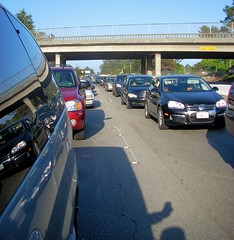If the price of gas rises, the cost of driving also rises, which may affect body weight in two ways. First, people may substitute from driving to walking, bicycling, or taking public transportation. Walking and bicycling are forms of exercise, which increase calories expended. If a person uses public transportation, such as subways, buses, trolleys, or rail services, the need to move to and from the public transit stops is likely to result in additional walking, again increasing calories expended. Second, since the opportunity cost of eating out at restaurants rises when the price of gas increases, people may substitute from eating out to preparing their own meals at home, which tend to be healthier. Income effects may also lead people to eat out less in an effort to save money to pay for the increased cost of gas.Courtemanche notes that the reduced obesity rates can save 16,000 lives and $17 billion per year in health costs, partially offsetting the pain of paying higher gas prices.
Props to Tim Grahl for this news.
Other news:
- Insanely long commutes. What kind of quality of life do you have when you leave home before dawn and get home in time to get to bed?
- Freegans opt out of capitalism and live off of consumer waste. With food prices rising to feed demand for fuel, however, there might not be as much consumer waste to go around.
- Of course if food is less available, we'll eat less and lose weight.
- Walk to school: It's the trendy thing to do!


.... so what's making me fat, then?
ReplyDeleteI've been hearing a lot about this study lately, and honestly I have a hard time believing that it would really make that big of a difference. Lazy people will still find ways to be lazy.
ReplyDeleteWe're lazy by nature. Laziness is inherent in us, and in fact laziness is a valuable survival trait for any animal. Super easy availability of cheap energy makes it *too* easy, unfortunately.
ReplyDelete